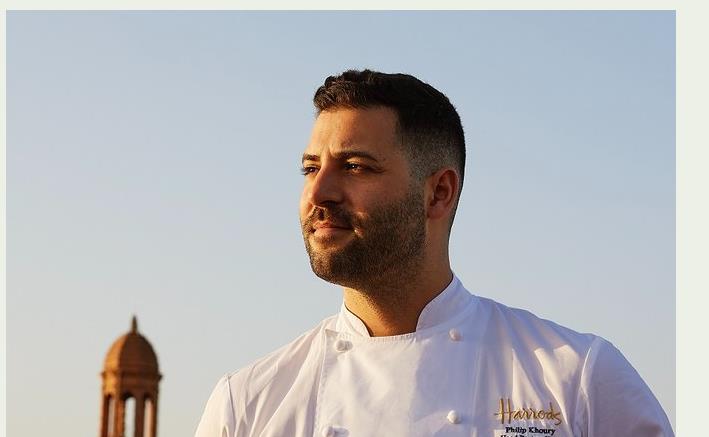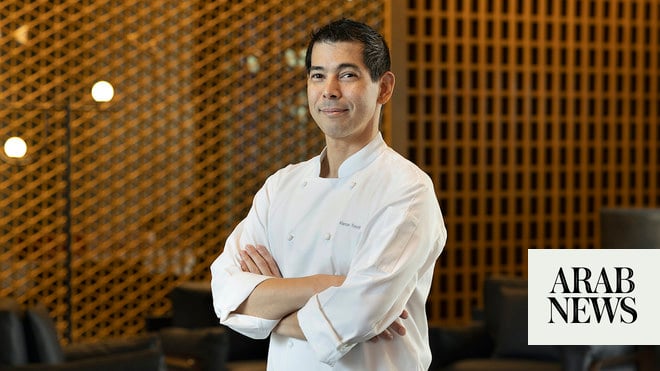
The Lebanese-Australian head pastry chef of historic luxury department store Harrods in London offers advice and a tasty Anzac cookies recipe
DUBAI: Philip Khoury’s is a true success story. His Lebanese parents fled their native country at the onset of its brutal civil war and moved all the way to Australia. “I think their intention was always to go back, and like everyone, they thought the war would end,” Khoury tells Arab News. “I think everyone has a troubled relationship with Lebanon.”
For the latest updates, follow us on Instagram @arabnews.lifestyle
Khoury always had an appetite for food — inspired especially by visits to his grandparents’ home in Lebanon. “I definitely get it from my family and my big Arab upbringing,” he says.
Philip Khoury has always had an appetite for food — inspired especially by visits to his grandparents’ home in Lebanon. (Supplied)
About five years ago, Khoury was visiting London, where he met the former head pastry chef of the world-famous UK department store, Harrods, a popular destination for Khaleeji tourists. A few days later, he was offered that coveted role himself. He was 29.
Aside from baking classic desserts, Khoury has infused some of his sweet treats with ingredients associated with the region, such as pomegranate molasses and orange blossom. “We feel very close to our Middle Eastern customers,” he says.
The patissier recently published a plant-based cookery book, “A New Way To Bake,” introducing novel, sustainable ways of baking dishes without eggs or dairy products. “It’s not the only way. It’s not the best way. It’s just another way,” he explains. “We have done things with eggs and dairy for so long, and I think we never questioned it. Eggs and dairy exist in our diets for good reason. But we never asked what it would look like without them.”
Here, Khoury discusses his dessert-loving family, the one strict policy he follows in the kitchen, and shares his recipe for Anzac biscuits, an Aussie-Kiwi delicacy.
Q: What’s your earliest food memory?
A: It’s probably the big sweet trays at my grandparents’ house. Also, my mom always used to wrap tahini halawa, honey and banana in a little sandwich for me, and that was a dessert.
When you started out as a professional, what was the most common mistake you made?
Young chefs, myself included, always have a tendency to overcomplicate things. There’s a level of ambition and sophistication that wants to be expressed, but real sophistication comes from saying the most with a few ingredients.
What one ingredient can instantly improve any dish?
As a pastry chef, salt is definitely my secret weapon. The other would be vanilla; it’s a beautiful rare ingredient that has been cheapened by countless imitations. But when you have real vanilla paste and vanilla extract coming from real vanilla beans, that’s a secret weapon.
Are you a disciplinarian in the kitchen? Do you shout a lot? Or are you more laidback?
I’ve been in kitchens where there’s shouting. We have a very strict policy of no shouting. I don’t believe in it. I don’t think you get the best out of people by berating them. You have to take them on the journey, which is more difficult. But a culture of respect and patience is absolutely the right way to go.
When you go out to eat, do you find yourself critiquing the food?
Yes, on some level, but I never like to express it. I’m there to enjoy it. Most of the time, I’m just grateful someone’s cooking for me.
What’s your top tip for aspiring chefs?
Eat out as much as you can. Traveling is a form of education and it’s one that I’ve invested heavily in. How do you know what’s good unless you’ve tried something that you really enjoyed? So you need to get out and taste as much as you can.
Chef Philip’s Anzac biscuits
Chef Philip’s Anzac biscuits. (Supplied)
INGREDIENTS:
65g muscovado sugar; 100g superfine caster sugar; 30g golden (or agave) syrup; 60g water; 60g extra virgin olive oil; 1g sea salt; 150g plain flour; 5g bicarbonate of soda; 90g porridge oats; 80g desiccated coconut
INSTRUCTIONS:
1. Add the sugars, syrup, water, olive oil and sea salt to a large bowl and whisk until fully combined and there are no oily streaks. This is your syrup.
2. In another large bowl, gently whisk the flour, bicarbonate of soda, oats and coconut together.
3. Add the syrup to the dry ingredients and mix until a dough forms, then leave to rest for 30 minutes.
4. Preheat oven to 180°C fan (350°F/gas 4). Use a 6-cm spring-loaded scoop or weigh out 60g pieces of dough and roll into balls. Arrange on a large baking sheet, lined with parchment paper, 5cm apart.
5. Bake until the cookies are evenly golden all over. 10 minutes for a chewy cookie or 12 minutes for a crispy one.
6. The cookies will look puffed up when you take them out of the oven, but they will deflate slightly and become crackly once they are completely cooled on the baking sheet or wire rack. Can be stored in an airtight container for up to five days.












